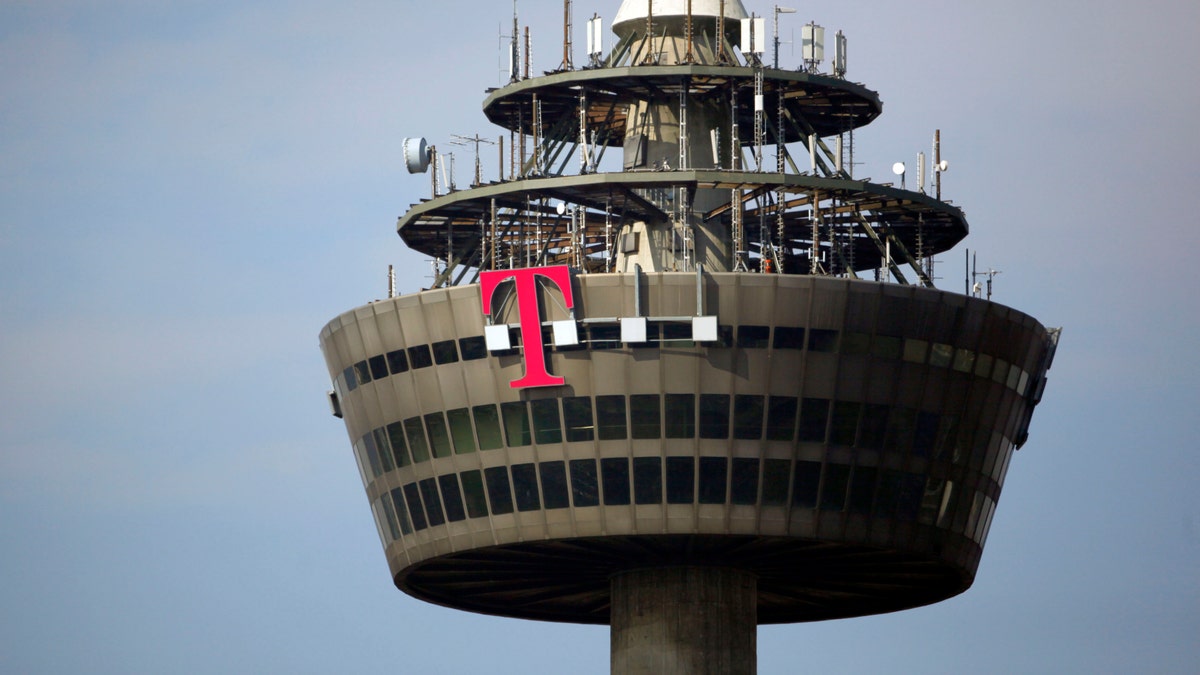
The logo of Deutsche Telekom is pictured on the TV tower in the German city of Cologne. (REUTERS/Wolfgang Rattay)
The National Security Agency is facing more allegations of cyber-snooping after reportedly targeting German telecom networks Deutsche Telekom and Netcologne as part of a sophisticated program to map the Internet.
Citing top-secret documents provided by NSA whistle-blower Edward Snowden, German newspaper Der Spiegel reports that the NSA and its British counterpart, GCHQ, have targeted the firms as part of a program dubbed "Treasure Map." Described by Der Spiegel as “the mandate for a massive raid on the digital world,” Treasure Map aims to make every single device connected to the Internet visible to the agencies, including computers, smartphones and tablets.
The report notes that employees of the so-called FiveEyes intelligence agencies -- America’s NSA and its counterparts in the U.K., Canada, Australia and New Zealand, can install the Treasure Map program for monitoring purposes. The program can also help with “Computer Attack/Exploit Planning,” according to the report.
Der Spiegel cites red markings on the documents denoting networks that agents claim to have accessed. Global telecom powerhouse Deutsche Telekom and German regional provider Netcologne are both reportedly marked in red.
With German Chancellor Angela Merkel at the center of a controversy over an alleged NSA phone tap, Der Spiegel’s report comes at a time of heightened sensitivity in Germany over the agency’s operations.
Michela Menting, cybersecurity practice director at the tech analyst firm ABI Research, told FoxNews.com that targeting telecom firms could offer intelligence agencies an easier path to information than targeting individuals and groups. “Deutsche Telekom is a Tier One operator, which means that both its scale and customer base is huge – global, of course – a goldmine for any ‘national security’ agency,” she said. “Since Germany is clearly not part of ‘the five eyes,’ they are a target, despite being allies.”
Deutsche Telekom provides a range of network, TV and mobile services to more than 60 million customers in Germany. Globally, the company has nearly 130 million customers.
However, Deutsche Telekom told FoxNews.com that it could not find any evidence that its networks were “manipulated,” even after weeks of investigation with experts from Der Spiegel.
“Right now, there is nothing more than a circle around a part of our network in a document provided by Edward Snowden,” explained Deutsche Telekom spokesman Philipp Blank, in a statement emailed to FoxNews.com. “Nevertheless, we take every hint very seriously and we have informed German security authorities. Any access by foreign intelligence services to our networks would be totally unacceptable.”
Netcologne also found no evidence that its networks had been breached. “When we were confronted with the information by Der Spiegel, we did a full check and review of the system,” the company’s CFO Mario Wilhelm told FoxNews.com. “We looked at the relevant systems and nothing materialized.”
The NSA has hardly been out of the spotlight since former contractor Snowden stole a cache of the agency’s documents last year and began releasing them to the press. Last month, for example, Snowden warned that the NSA’s cyberwarfare efforts could pick the wrong targets. More recently, the leaker alleged that the NSA is collecting mass surveillance data on New Zealanders via its XKeyscore program and had set up a facility in the country to tap huge volumes of data.
The NSA declined to comment on the specific allegations in Der Spiegel’s story when contacted by FoxNews.com.
"We are not going to comment on any alleged, specific foreign intelligence activities,” said NSA spokeswoman Vanee Vines, in a statement emailed to FoxNews.com. “NSA collects only those communications that we are authorized by law to collect for valid foreign intelligence and counterintelligence purposes.”
A spokesman for GCHQ also declined to comment. “It is longstanding policy that we do not comment on intelligence matters,” he said, in an emailed statement. “All of GCHQ's work is carried out in accordance with a strict legal and policy framework, which ensures that our activities are authorized, necessary and proportionate,” he added, noting that this is overseen by the U.K.’s Secretary of State for Foreign and Commonwealth Affairs and Parliament’s Intelligence and Security Committee.
Follow James Rogers on Twitter @jamesjrogers
